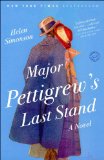Summary | Excerpt | Reading Guide | Discuss | Reviews | Beyond the Book | Read-Alikes | Genres & Themes | Author Bio

A Novel
by Helen SimonsonThis article relates to Major Pettigrew's Last Stand
 Helen Simonson shares some thoughts on her writing, her life and Major Pettigrew in an interview with our reviewer, BJ Nathan Hegedus:
Helen Simonson shares some thoughts on her writing, her life and Major Pettigrew in an interview with our reviewer, BJ Nathan Hegedus:
Major Pettigrew's Last Stand offers an enlightening view of the divide between provincial and cosmopolitan, traditional and contemporary. What made you want to write about this? Was there a Major Pettigrew or Mrs. Ali in your childhood village?
Major Pettigrew may look, at first, to be the very image of the tradition-bound, English man who would live in a village like mine. Yet I wanted to show that none of us is our own stereotype – not even the English! The Major is an individual and he reflects the struggle we all face between daily life and ethics, between cherished traditions and the desire to be free. I wanted to show how humor, and some truth, lives in the gaps between our intentions and our actions in this regard.
Mrs. Ali fascinated me because she is everything an English woman like me would aspire to be. She is educated, cultured, gracious, open - and she lives in the country. Yet her Pakistani heritage brands her as a permanent outsider. I wondered how it must feel to have grown up in England, just as I did, but then to have fellow citizens, deny you your place. Mrs. Ali's dignity, in the face of all the petty insults of provincial life, seemed a story worth telling.
Which came to mind first: the story you wanted to tell or the characters with which to tell it?
One day I sat down to write a story just for me; not written with regard to how it would be read by others. My thoughts went home to the countryside I miss and the Major simply showed up; opening the door of his home, Rose Lodge, to Mrs. Ali from the village shop.
There were many ideas stored in my mind: how inheritance corrupts families; the urge of communities to define themselves by excluding outsiders; what 'family' really means and what we might really be prepared to give up for our principles. I tried to set all these 'big' ideas firmly in the background and just let people walk about in the village of Edgecombe St, Mary. I always tried to follow the action, not dictate a particular story line. Of course, there came several moments where I had to sit the Major down and ask him, ever so politely, to please hurry up and decide what to do next!
You say that Major Pettigrew first came to life as a short story. At what point did you realize that you had a full-length novel on your hands?
I was very nervous to show this story to Clark Blaise, the short story writer with whom I was studying at the time. Because it is so deliberately NOT a gritty, contemporary tale, I really thought he would hate it. Instead he met me with a huge smile and told me, very excitedly, that he thought I had found my novel. I showed it to a few other people and their happy response and eager questions about what the Major would do next, seemed to suggest that I was on to something. It seemed an alarming but wonderful responsibility.
Read the full interview
![]() This "beyond the book article" relates to Major Pettigrew's Last Stand. It originally ran in March 2010 and has been updated for the
December 2010 paperback edition.
Go to magazine.
This "beyond the book article" relates to Major Pettigrew's Last Stand. It originally ran in March 2010 and has been updated for the
December 2010 paperback edition.
Go to magazine.
Idealism increases in direct proportion to one's distance from the problem.
Click Here to find out who said this, as well as discovering other famous literary quotes!
Your guide toexceptional books
BookBrowse seeks out and recommends the best in contemporary fiction and nonfiction—books that not only engage and entertain but also deepen our understanding of ourselves and the world around us.